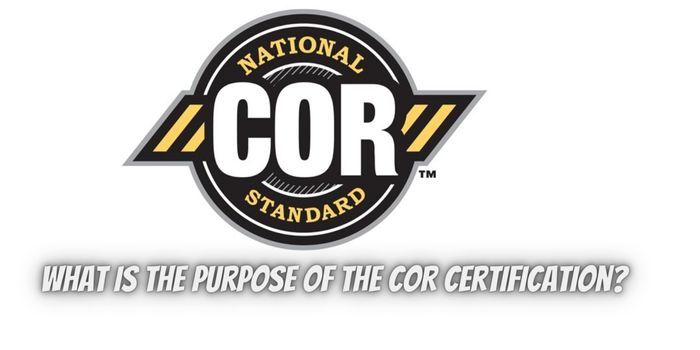What is the purpose of the COR Certification?

COR (Certificate of Recognition) Certification serves the vital role of fostering a culture of workplace safety across diverse industries. This program is meticulously crafted to acknowledge and incentivize organizations that have successfully implemented robust health and safety management systems. Its core objective revolves around enhancing workplace safety, reducing accidents and injuries, and ensuring strict adherence to pertinent health and safety regulations.
The purpose and significance of COR Certification
Promoting Workplace Safety
One of the primary objectives of COR Certification is to promote workplace safety. By implementing a comprehensive health and safety management system, organizations can identify and mitigate potential hazards, leading to a safer work environment for employees. Safety should always be a top priority in any workplace, and COR Certification assures a structured framework for achieving this goal.
Reducing Accidents and Injuries
Workplace accidents and injuries carry profound repercussions for both employees and organizations. The COR Certification program is dedicated to mitigating these consequences by motivating companies to institute and uphold rigorous safety protocols. Through the promotion of safety prioritization and the adoption of industry best practices, this program substantially curtails the risk of accidents and injuries, fostering a workforce that is not only healthier but also more productive.
Compliance with Regulations
Numerous countries implement rigorous health and safety regulations to safeguard both workers and the public. COR Certification plays a pivotal role in aiding organizations in their compliance efforts. By embracing the program’s prerequisites, companies can showcase their dedication to fulfilling legal responsibilities, thereby averting potential financial penalties and legal entanglements stemming from non-compliance.
Improving Employee Morale and Engagement
Safe workplaces lead to happier and more engaged employees. When workers feel that their well-being is a must priority, they are more likely to be motivated, productive, and satisfied with their jobs. COR Certification signals to employees that their employer values their safety and is willing to invest in creating a secure work surrounding.
Enhancing Reputation
COR Certification also contributes to an organization’s reputation. When customers, clients, and partners see that a company has achieved this certification, they are more likely to trust that the organization operates with integrity and a commitment to safety. This can lead to boosted business opportunities and competitive advantages in the marketplace.
Reducing Costs
Workplace accidents and injuries can be costly for organizations in terms of medical expenses, workers’ compensation claims, legal fees, and lost productivity. COR Certification helps lessen these costs by preventing accidents and injuries in the first place. Additionally, it may lead to reduced insurance premiums as insurers often offer discounts to certified companies that demonstrate a commitment to safety.
Continuous Improvement
COR Certification represents a continual dedication to safety rather than a one-time accolade. Organizations must consistently assess and enhance their health and safety management systems to retain this certification. This instills a culture of perpetual improvement, motivating companies to continually enhance safety measures and reduce risks.
Industry Standard
In many industries, COR Certification is considered the industry standard for health and safety excellence. It sets a benchmark that organizations strive to meet or exceed, fostering healthy competition among companies to excel in safety practices. This industry-wide recognition can further motivate organizations to invest in safety initiatives.
Risk Management
Effective risk management is an elemental component of COR Certification. Organizations are encouraged to identify, assess, and mitigate risks systematically. This proactive approach to risk management not only prevents accidents but also helps organizations better prepare for unexpected challenges.
How to get a COR Certification?
Here are the general steps to get COR Certification:
-
Understand the Requirements:
Before you begin the COR Certification process, it’s crucial to familiarize yourself with the specific COR requirements and guidelines relevant to your industry and region. These requirements often come from government agencies, industry associations, or regulatory bodies.
-
Appoint a COR Coordinator:
Choose a capable individual within your organization to take on the role of the COR coordinator. This essential team member will be responsible for overseeing the COR process, coordinating associated tasks, and acting as the primary contact for external auditors.
-
Documentation and Record-keeping:
Maintain detailed records of safety policies, procedures, incident reports, training records, and any other relevant documents. Proper record-keeping is elemental for the COR Certification process.
What to consider before being a COR Certified company?
Here are key considerations:
-
COR Program Requirements:
Understand the specific COR program requirements applicable to your industry and region. These requirements can vary, so research and ensure you meet the standards set by the relevant authorities.
-
Organizational Commitment:
Assess your organization’s commitment to health and safety. Certification requires a strong commitment to workplace safety from leadership to employees. Ensure that there is buy-in at all levels.
-
Leadership Support:
Ensure that your company’s leadership is fully supportive of the COR certification process. Leadership commitment sets the tone for the organization’s safety culture.
-
COR Coordinator:
Designate a COR coordinator or responsible individual within your organization who will oversee the certification process, coordinate activities, and serve as the point of contact for external auditors.





